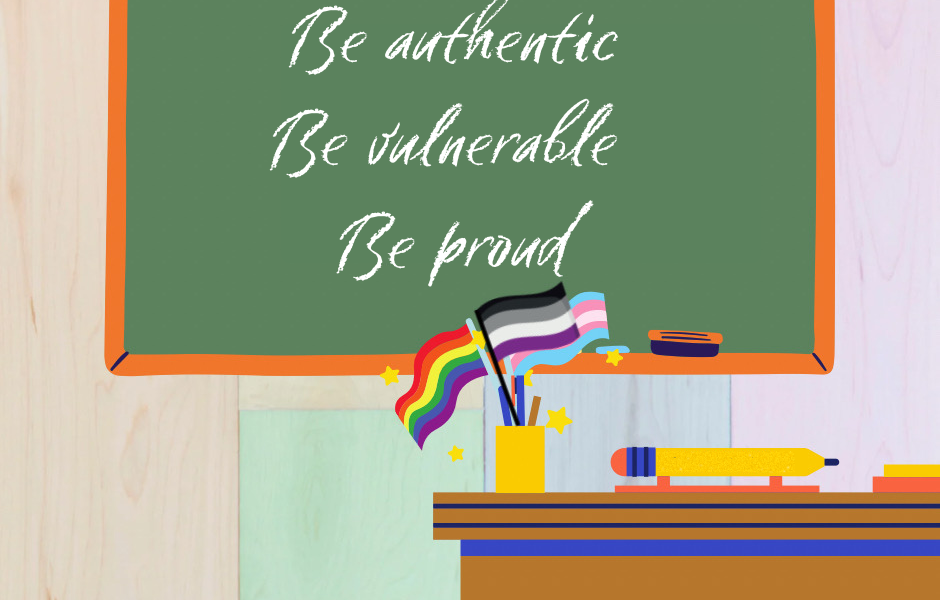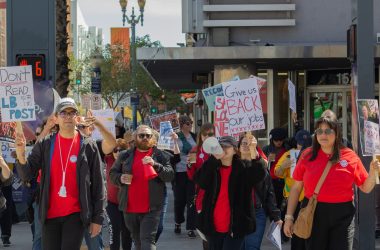For Alfredo Heredia, who identifies as queer and nonbinary, being proud of their identity is important not just for themselves but for their future students.
As an English literature major in Long Beach State’s teaching credentialing program, Heredia aspires to teach English at the high school level, a time when many students are finding themselves.
“If we’re open about our identities in the classroom, it provides students a sort of framework to say ‘Okay, it’s alright to exist this way because there are people within my community who are not being actively harmed while still being active, contributing members of society,’” Heredia said.
Heredia’s concerns stem from the reactions parents and faculty may have. They wonder if parents will be comfortable with someone who is outwardly queer and nonbinary teaching their children.
For music education major, Michelle Smirnoff, who identifies as queer, parent reactions are also one of her major concerns when thinking about her future as an educator.
She believes authenticity is crucial to an educator’s relationship with their students, but wonders if it might “turn parents off” or if they will struggle to see past just that.
Some of Heredia’s strategies to combat this are normalizing queer identities and undoing preconceived notions of who non-binary people are. One way they plan to normalize queerness is through how they decorate their classroom; they envision their future desk having multiple pride flags, especially those less often represented like asexuality.
As important and impactful as their queer identity is, Heredia and Smirnoff also believe it is important to acknowledge how intersectionality affects them as people and educators.
For Heredia, as a Latinx person from the working class, being a part of historically marginalized groups has impacted how they view education and why they decided to pursue a career in it.
“It really puts into perspective power structures, how the education system fits into those power structures and how it can be subverted to work against repetitive systems that exploit marginalized people,” Heredia said.
Having never had a female band director herself, Smirnoff said it is not only her queerness but her gender that she hopes will make a difference for her students. However, being cisgender and white, Smirnoff emphasized the importance of not only recognizing her privilege but the responsibility that comes from it for her to be vocal about her identity.
“The many privileges that I have demand that I am out and proud… I think that even if I was a little nervous, if that’s not worth standing up for, I don’t know what is,” Smirnoff said.
Whereas Smirnoff feels pretty confident about her sexuality right now, she said it is still unclear how comfortable she will feel when outwardly expressing it in her future classroom.
Smirnoff joined the Queer and Trans Future Educators club on campus, a resource that she said would help with navigating the unknown by connecting her with folks who have gone through the same experience.
As someone who has navigated through some of these challenges, assistant professor in the department of political science at CSULB Kathryn Perkins has some advice for upcoming queer educators.
Perkins is a trans queer educator, and what she has learned from navigating coming out—first as gay man and years later as a trans woman—is that the best thing to do is be vulnerable, be confident and find your people.
She said being vulnerable will not only make you more approachable but will give you the confidence you need to lead the classroom.
“Vulnerability is a superpower, you know, the more that you show of yourself the more people can see your light, the more that people can see how much you are embodying yourself, the more that that makes other people want to do that too,” Perkins said.
Because this vulnerability is important, Perkins encourages queer educators to be loud and proud about identity—always assessing one’s environment first to make sure it is safe to do so—and that as scary and intimidating as coming out can be, it is much more rewarding and fair to oneself to “be who you are.”
“My biggest advice is to be brave and shine bright, trust that by doing that, you are going to be met with a lot of love and validation by people who can recognize that [you] are creating that kind of safe space for everyone,” Perkins said.




